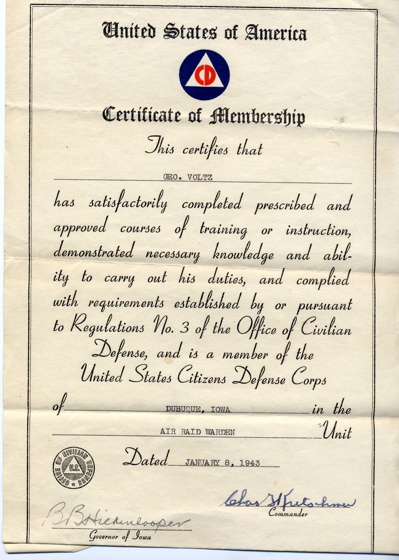Encyclopedia Dubuque
"Encyclopedia Dubuque is the online authority for all things Dubuque, written by the people who know the city best.”
Marshall Cohen—researcher and producer, CNN
Affiliated with the Local History Network of the State Historical Society of Iowa, and the Iowa Museum Association.
CIVIL DEFENSE: Difference between revisions
No edit summary |
No edit summary |
||
| Line 5: | Line 5: | ||
In Operation Alert, Iowa Civil Defense headquarters in Des Moines received a call that enemy plane were sighted over Alaska. State headquarters phoned other cities in the state. At 11:15 a.m. sirens began blasting away and remained going for ten minutes. When it was learned that Dubuque was not "hit," the city was to assume a support role. City manager Laverne Schiltz opened a letter at 1:00 p.m. which told him of "Dubuque's fate." (1) | In Operation Alert, Iowa Civil Defense headquarters in Des Moines received a call that enemy plane were sighted over Alaska. State headquarters phoned other cities in the state. At 11:15 a.m. sirens began blasting away and remained going for ten minutes. When it was learned that Dubuque was not "hit," the city was to assume a support role. City manager Laverne Schiltz opened a letter at 1:00 p.m. which told him of "Dubuque's fate." (1) | ||
In 1966, the Iowa law allowing the civil defense department to plan for natural disasters as well s nuclear attack was passed. (2) | |||
In 1968 Dubuque was one of the few towns in the Tri-State area to have a Civil Defense warning siren and a carefully planned warning system. The Dubuque weather bureau was responsible for contacting adjoining counties with disaster warnings and alerts through the Dubuque County sheriff's office. There was a county-wide system of spotters living within a five-mile radius of a community in Dubuque County with the responsibility of notifying their town's Civil Defense officials if they saw funnel clouds or other signs of bad weather. George Orr, the Iowa Civil Defense Director, stated that city officials were reluctant to spend the money on tornado warning systems. This was despite the fact that a city installing an system would receive half of the cost reimbursed by the federal government. (2) | |||
See: [[GROUND OBSERVER CORPS]] | See: [[GROUND OBSERVER CORPS]] | ||
| Line 13: | Line 17: | ||
1. "Alert 'Bombs' Miss Dubuque," ''Telegraph Herald'', September 12, 1957, p. 1 | 1. "Alert 'Bombs' Miss Dubuque," ''Telegraph Herald'', September 12, 1957, p. 1 | ||
2. "Iowans Better Prepared for Natural Disaster," ''Telegraph Herald'', May 31, 1972, p. 6 | |||
2. Hansen, Christine, "Disaster Warning Systems Lacking," ''Telegraph Herald'', June 6, 1968, p. 16 | |||
[[Category: Events]] | [[Category: Events]] | ||
[[Category: Organizations]] | [[Category: Organizations]] | ||
Revision as of 16:50, 2 June 2017
CIVIL DEFENSE. For the history of Civil Defense in the United States, see: http://www.civildefensemuseum.com/history.html
In 1957 Dubuque was not one of the cities "hit" by hypothetical atomic bombs during Operation Alert. This was fortunate because the city did not have a Civil Defense director or a working disaster plan.
In Operation Alert, Iowa Civil Defense headquarters in Des Moines received a call that enemy plane were sighted over Alaska. State headquarters phoned other cities in the state. At 11:15 a.m. sirens began blasting away and remained going for ten minutes. When it was learned that Dubuque was not "hit," the city was to assume a support role. City manager Laverne Schiltz opened a letter at 1:00 p.m. which told him of "Dubuque's fate." (1)
In 1966, the Iowa law allowing the civil defense department to plan for natural disasters as well s nuclear attack was passed. (2)
In 1968 Dubuque was one of the few towns in the Tri-State area to have a Civil Defense warning siren and a carefully planned warning system. The Dubuque weather bureau was responsible for contacting adjoining counties with disaster warnings and alerts through the Dubuque County sheriff's office. There was a county-wide system of spotters living within a five-mile radius of a community in Dubuque County with the responsibility of notifying their town's Civil Defense officials if they saw funnel clouds or other signs of bad weather. George Orr, the Iowa Civil Defense Director, stated that city officials were reluctant to spend the money on tornado warning systems. This was despite the fact that a city installing an system would receive half of the cost reimbursed by the federal government. (2)
---
Source:
1. "Alert 'Bombs' Miss Dubuque," Telegraph Herald, September 12, 1957, p. 1
2. "Iowans Better Prepared for Natural Disaster," Telegraph Herald, May 31, 1972, p. 6
2. Hansen, Christine, "Disaster Warning Systems Lacking," Telegraph Herald, June 6, 1968, p. 16



